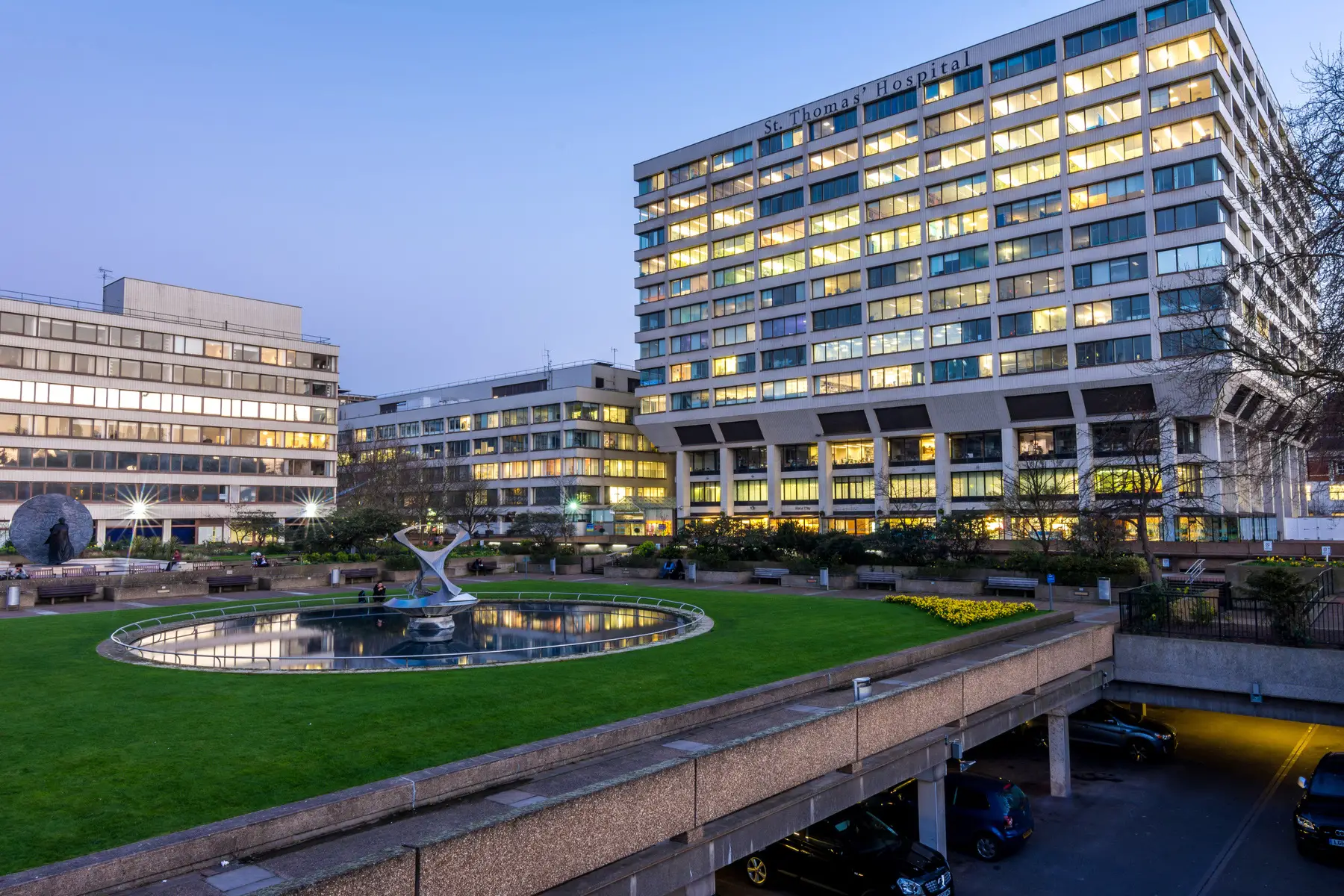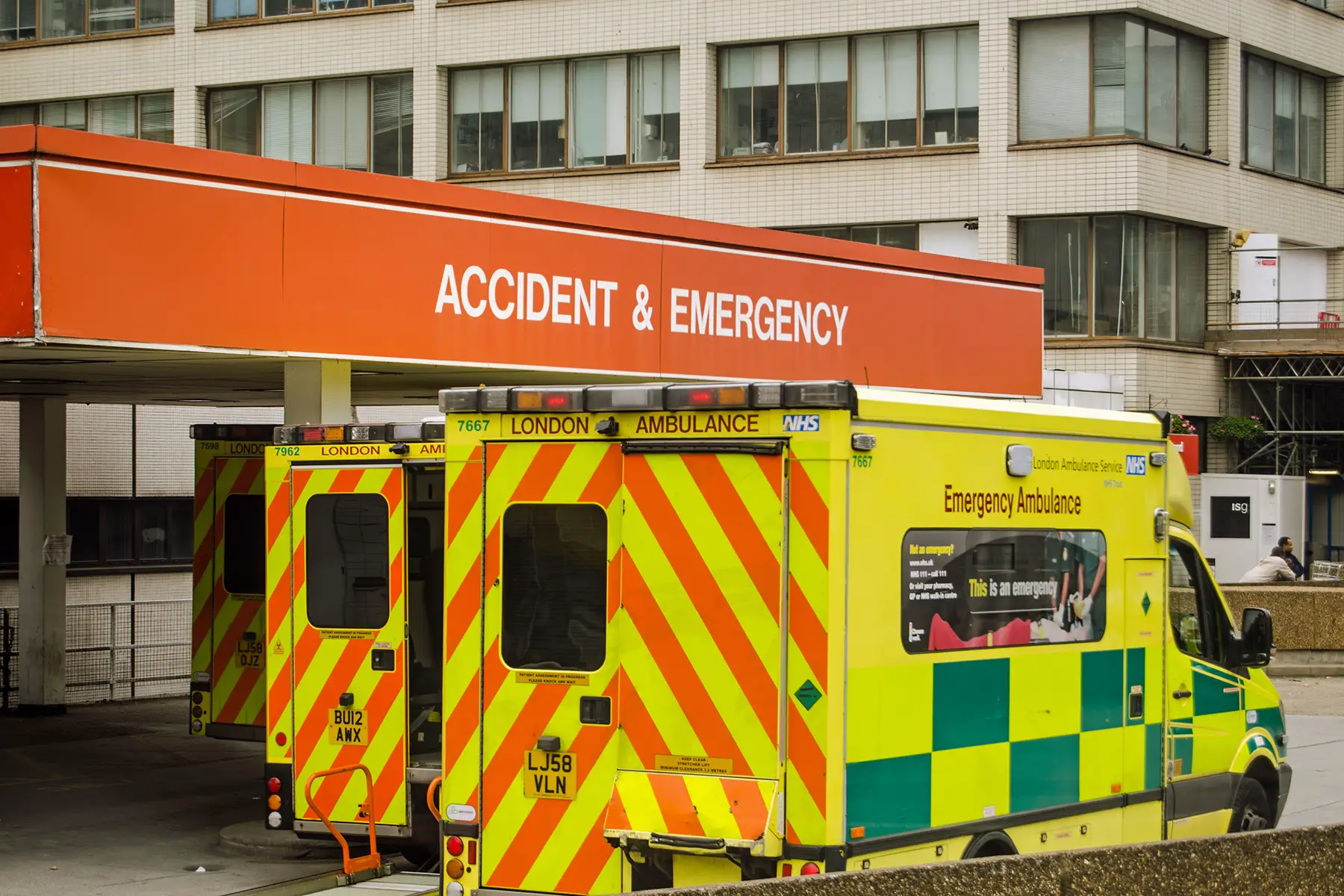If you are moving to the UK, you will be happy to know that the country is home to some of the best hospitals in the world. There are two general types of hospitals in the UK; those which operate within the National Health Service (NHS) and offer free healthcare, and independent hospitals which are run by private companies or charities and charge for services.
Whichever system you use, it’s important to understand how hospitals in the UK function. So to help you out, our guide looks at the following:
Cigna Global
Enjoy peace of mind while living in the UK with Cigna Global’s long-term international health insurance plans (12+ months). Get tailored coverage, direct billing with many providers, complex case management, and global care on demand, with access to a network of 1.5+ million doctors, specialists, and therapists.
Hospitals in the UK
The UK hospital system includes both public hospitals and those which are independent and run by private companies or not-for-profits. Most of the hospitals in the country are part of the National Health Service (NHS) which is publicly funded and run by trusts. As an expat living in the country, you can access free NHS healthcare and choose from a range of public hospitals, depending on the service you need and your location.

There are also university hospitals (or teaching hospitals) that operate within the public healthcare system and are connected to the NHS and institutions of higher learning. The medical staff train at these hospitals, which are considered to have unrivaled expertise and facilities.
In addition, there are 14 NHS children’s hospitals in the UK, of which the most famous is Great Ormond Street Hospital in London. It offers 63 clinical specialties, which is the widest range of health services for children in the UK. While some hospitals treat a range of conditions on an elective or emergency basis, others specialize in a field such as ophthalmology or cancer. One such example is Royal Marsden, which is the first hospital in the world that dedicates itself to the study and treatment of cancer.
Within the independent sector, the UK’s largest healthcare charity, Nuffield Health, has over 30 private hospitals. Meanwhile, the largest independent provider of acute surgical services, Circle Health Group, has over 50 private hospitals in the country and offers access to more than 4,000 consultants.
In summary, you can choose to access many different types of hospitals in the UK, whether public or independent.
The four NHS systems in the UK
In the UK, the National Health Service (NHS) is the umbrella term for the four health systems of England, Scotland, Wales, and Northern Ireland. However, in Northern Ireland, the NHS was merged with the broader social care system in 1973 and called the Health and Social Care (HSC) system rather than the NHS.
These systems operate independently of each other as they are devolved and overseen by individual governments. Notably, most of the information provided in this guide refers to the NHS in England, which is the largest provider of healthcare in the UK. So if you need specific advice for Wales, Scotland, or Northern Ireland, please refer to their individual websites.
Services in UK hospitals
A UK hospital will typically include the following services, although this list is not exhaustive and it is best to check the NHS services near you:
- Accident and Emergency services (A&E)
- Women’s healthcare
- Maternity services and family planning
- Ear, Nose, and Throat (ENT)
- Sexual health
- Specialist care such as ophthalmology, oncology, urology, cardiology, and dermatology
- Oral surgery
- Geriatric care
- Mental healthcare

If you require maternity services, it is worth checking what your options are with your GP. Notably, you can choose your midwife team and how you would like to give birth, depending on your individual circumstances and a risk assessment. You can read more about this in our UK pregnancy guide.
Waiting times at UK hospitals
The maximum time you should wait to start non-urgent treatment in the UK is 18 weeks, or two weeks if the treatment is for cancer. This starts from the date that a hospital receives a referral letter from your GP (general practitioner) or from when you book an appointment through the NHS e-referral service after speaking to your doctor. However, it is important to bear in mind that waiting times can vary as COVID-19 has put a huge strain on the NHS and hospital system.
In fact, the number of people waiting for hospital treatment in England has hit a record high of 5.7 million as the NHS struggles to clear the growing backlog of care worsened by the pandemic. If you have been waiting for more than 18 weeks to start treatment, you have a right to change hospitals, however, there are exceptions. It is also worth mentioning that waiting lists for some procedures can be longer than a year.

Because of this, The Commonwealth Fund, a prominent think tank in the United States, has downgraded the UK healthcare system to fourth overall, among 11 wealthy countries. It had previously ranked number one in two separate reports, in 2014 and 2017.
To summarize, the UK healthcare system is under a lot of strain and waiting lists are longer than in previous years.
How to access hospital treatment in the UK
Hospitals in the UK are secondary care services, meaning that your GP typically refers you, except for in an emergency. Essentially, anyone living in the UK can access hospital treatment through the NHS, which is free at the point of use. However, if you have just moved to the UK or are staying there temporarily, then charges may apply.

Notably, citizens from the EU/EEA and Switzerland can use their European Health Insurance Card (EHIC) to access treatment in the UK; be it for an emergency or not. However, different charges will apply to those who are from outside these areas.
Before you can be referred to a specialist service at a hospital, the first step is to speak to your doctor. This applies to both inpatient and outpatient services. Your doctor will then write a referral letter to your agreed hospital, or give you the go-ahead to book an appointment through the NHS e-referral system. You will generally receive a letter, phone call, or text to confirm your appointment.
Notably, while you may not need to know your NHS number in order to receive care, it will help NHS staff find your health records. You will get an NHS number and card when you register with your GP, and this number will also be on your referral letter.
Services not covered by the NHS
It is important to be aware that while the NHS provides free healthcare at the point of use, it will not cover all services; for instance, procedures that are considered to be cosmetic or some drugs and treatments that are new or experimental, such as breakthrough cancer drugs.
Of course, you can always choose to see a private consultant or opt to have private treatment. In this case, you will need to arrange private health insurance or cover the costs out of pocket. You can read more about this further down the guide. Depending on your job, some employers will also offer private medical insurance as a staff benefit.
To be clear, if you are going down the private route, you will likely not need to seek a GP referral first and will cut back significantly on waiting times.
Emergency treatment in the UK
The NHS responds to over 110 million urgent calls or visits every year. Anyone can receive emergency medical attention in the UK. And as an expat living in the country, you won’t need to pay to visit an Accident and Emergency (A&E) department.
The NHS distinguishes between emergency care and urgent care. If you or someone you are with requires immediate, emergency attention, you should call 999. You will be connected to a team that can dispatch an ambulance and will assess the emergency. Alternatively, you can simply show up to any A&E department in an emergency and wait to be seen.

Notably, it is possible to contact the emergency services by text if you can’t make a voice call, but you must register with the emergency SMS service first. You can simply text ‘register’ to 999 to sign up.
If you require urgent care and can’t speak to your doctor, you should call 111. You will be asked a series of questions and directed to the most appropriate service for your condition or problem. You can also go online and contact NHS 111 for pharmacy advice or urgent refills, out-of-hours GP appointments, and referrals to urgent treatment centers.
Hospital stays in the UK: what to expect
If you are admitted to a hospital in the UK, it is likely that you will end up in a ward that has beds separated by curtains. In most cases, you won’t have a private room or bathroom, and you will be given limited meal choices.
That said, visitors are usually allowed to bring in food from outside and you can also bring your own personal items, such as toiletries and clothes. You will likely need to bring your own laptop or device for watching programs or entertainment. In summary, wards are basic and facilities will vary based on their location.
Private hospitals in the UK
By contrast, private hospitals in the UK offer better facilities and are likely to look more state of the art. Essentially, the main differences are privacy and comfort. For instance, you will be offered a private room, given more extensive food options, and generally enjoy a more relaxing environment.

Having said that, the medical attention that you will receive in a private hospital is unlikely to be superior to what the NHS offers. In fact, your private doctor or consultant may actually work for the NHS. Moreover, NHS hospitals also perform private procedures and reserve some beds for private patients. Your private health insurance provider may even offer you a cash benefit for having a private procedure in an NHS hospital. You just need to check your individual plan.
Hospital costs in the UK
There is no cost for receiving care at an NHS hospital as treatment is covered through the country’s government-funded universal healthcare system. Therefore, you will not be sent an itemized bill after your stay, unlike in the United States.
Prescriptions are also subsidized, and whether you pay will depend on your age or circumstances. For instance, those under 16 years of age or over 60 do not pay, as well as women who are pregnant or have had a baby in the previous 12 months.
Health insurance for hospital costs in the UK
On the other hand, charges do apply to private hospitals and private treatment, and your insurance plan will cover all or some of these costs. It is important to understand that without having private health insurance, you will need to pay out of pocket, and these costs can really mount up. For instance, a consultation can range from around £100 to £250 and a surgical procedure can cost more than £10,000.
Healthcare is generally available on both a personal and family basis, and premiums depend on your level of cover, lifestyle, age, and pre-existing medical conditions. Notably, most private policies will not cover emergency treatment, maternity services, and treatment for long-term or chronic conditions such as diabetes or arthritis.
Some of the largest health insurance companies in the UK include:
Of course, it is important to check individual plans to see what is covered through insurance, whether there is an upfront cost, and how you can claim back for medical procedures and treatments. You can discuss payment plans with your chosen insurance provider.
Being discharged from UK hospitals
Each hospital in the UK has its own discharge policy and your medical team or consultant will discharge you. You will receive a discharge letter and instructions for follow-up care, including a list of prescriptions and enough medicine for about a week.
The kind of outpatient care you receive will depend on your health condition and its complexity.
Visiting someone in a UK hospital
Visiting hours and rules will depend on the hospital, and you should check with the hospital or visit its website in advance. Because of COVID-19, rules have also been tightened. For this reason, you may not be able to visit the person because of additional restrictions.
However, if you do arrange a visit, you can generally bring in food, tablets, laptops, toiletries, magazines, books, and so on. That said, you should check with the ward beforehand to confirm what you can bring for patients.
The best hospitals in the UK
While the UK is home to some of the best hospitals in the world, league table rankings can really vary. After all, these are only guidelines and other sources could have different rankings.

The Care Quality Commission (CQC) independently inspects and rates NHS hospitals and independent (private) hospitals. You can use its search tool to help you understand the quality of care at a particular hospital.
Below is a summary of three of the top-ranking hospitals in the UK.
Guy’s and St Thomas’ Hospital (London)
Coming in at number 44 in the global league table, Guy’s and St Thomas’ in London is the highest-ranking hospital in the UK. Renowned for medical research, innovation, and training, this NHS hospital has several specialties. It is part of King’s Health Partners, an academic health center that is based in the capital and is famous for its clinical excellence.
Freeman Hospital (Newcastle upon Tyne)
Located in Newcastle upon Tyne in the North East of England, Freeman Hospital has an international reputation for transplant surgery and carried out the UK’s first successful baby heart transplant in 1987.
Royal Berkshire Hospital (Reading)
Located in Reading, Berkshire, the highly-rated Royal Berkshire Hospital has earned praise and recognition for its cleanliness, dementia care, and acute stroke unit. Serving more than 500,000 people, it is one of the largest NHS hospitals in the UK.
List of UK hospitals
Below are some of the major hospitals in the UK’s biggest cities. You can also use the NHS search tool to find your closest public hospital.
London
- Chelsea and Westminster Hospital NHS Foundation Trust
- Great Ormond Street Hospital NHS Foundation Trust
- Guy’s and St Thomas’ NHS Foundation Trust
- Homerton University Hospital NHS Foundation Trust
- King’s College NHS Foundation Trust
- London Bridge Hospital
- Moorfields Eye Hospital NHS Foundation Trust
- North East London Mental Health NHS Foundation Trust
- The Portland Hospital for Women and Children
- Royal Marsden Hospital NHS Foundation Trust
- South London and Maudsley NHS Foundation Trust
- South West London and St George’s Mental Health NHS Trust
- St George’s University Hospitals NHS Foundation Trust
- University College Hospital NHS Foundation Trust
- University College London NHS Foundation Trust
Birmingham
- Birmingham Women’s and Children’s NHS Foundation Trust
- Sandwell and West Birmingham NHS Trust
- University Hospitals Birmingham NHS Foundation Trust
Manchester
- The Christie NHS Foundation Trust
- Manchester University NHS Foundation Trust
- Northern Care Alliance NHS Foundation Trust
Newcastle
Sheffield
Liverpool
- Clatterbridge Cancer Centre NHS Foundation Trust
- Liverpool University Hospitals NHS Foundation Trust
- Merseycare NHS Foundation Trust
Bristol
Cardiff
Swansea
Edinburgh
Glasgow
Belfast
Private hospitals
Useful resources
- NHS England – includes a list of healthcare services, news, and information
- NHS Scotland – the website of Scotland’s universal healthcare provider
- Health and Social Care (Northern Ireland) – Northern Ireland’s universal healthcare provider
- NHS Wales – Wales’ universal healthcare provider
- HCA Healthcare – provides information about private hospitals in London
- Circle Health Group – the largest independent provider of acute surgical services with over 50 private hospitals in the UK
- Nuffield Health – the largest healthcare charity in the UK with over 30 private hospitals
- The world’s best hospitals 2021 – a Newsweek article that ranks the best hospitals across 25 countries







